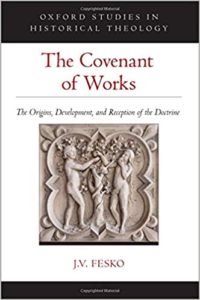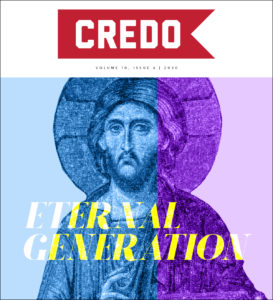It is widely known to readers of the Bible that scripture contains a number of divinely-established covenants. It is less-widely acknowledged that God entered into a “covenant of works” with Adam in the Garden of Eden before the fall of mankind into sin.  This doctrine is a staple of Reformed theology, with the theologians at Westminster asserting in 1647 that “The first covenant made with Man, was a Covenant of Works, where in Life was promised to Adam, and in him to his posterity, upon condition of perfect and personal obedience” (WCF, VII.2). According to this doctrine, God bound himself in a covenant to reward Adam and his posterity with life on the basis of Adam’s personal “work” of obedience. Adam was thus the covenant (or “federal”) head of all mankind, with his obedience or disobedience bringing death or life to all of his posterity. In spite of the place that the Covenant of Works played in the Reformed thought of the sixteenth and seventeenth centuries especially, the doctrine has been criticized and rejected by many in our day, even by those who see themselves as within the Reformed tradition.
This doctrine is a staple of Reformed theology, with the theologians at Westminster asserting in 1647 that “The first covenant made with Man, was a Covenant of Works, where in Life was promised to Adam, and in him to his posterity, upon condition of perfect and personal obedience” (WCF, VII.2). According to this doctrine, God bound himself in a covenant to reward Adam and his posterity with life on the basis of Adam’s personal “work” of obedience. Adam was thus the covenant (or “federal”) head of all mankind, with his obedience or disobedience bringing death or life to all of his posterity. In spite of the place that the Covenant of Works played in the Reformed thought of the sixteenth and seventeenth centuries especially, the doctrine has been criticized and rejected by many in our day, even by those who see themselves as within the Reformed tradition.
J. V. Fesko has written his newest book as a defense of the covenant of works. Fesko’s stated purpose is “to prove that, despite its negative reception in the twentieth century, early modern Reformed theologians of the Reformation (1517-65), Early Orthodoxy (1565-1640), and High Orthodoxy (1640-1700) constructed the doctrine in an exegetically careful manner by collating numerous biblical texts to conclude that God created Adam and entered into a covenantal relationship with him.” Further, Fesko asserts that the covenant of works was “not a de novo creation of Reformed theology but has pedigree in a number of key theological loci, including anthropology, Christology, soteriology, and eschatology” (2). The doctrine of this pre-fall covenant was developed in sixteenth and seventeenth centuries in continuity with not only the thought of John Calvin but with a variety of theological and exegetical strands found within patristic, medieval, Reformation, and certain Roman Catholic sources in the sixteenth century.
Fesko develops his argument chronologically, beginning with patristic, medieval, and Reformation-era articulations of basic elements that would by synthesized into a mature doctrine of the covenant of works, with Fesko concluding that “all of the building blocks for the covenant of works were…already in place long before the sixteenth century” (31). Reformation-era theologians, including Roman Catholic theologians like Diego Lañyez and Ambrogio Catharinus, did not invent the idea of a pre-fall covenant with man but developed their understanding of this doctrine with significant precedents already in place from the patristic and medieval periods.
Fesko highlights the contribution of the under-appreciated Scottish theologian Robert Rollock (c. 1555–1559), who was “one of the first Reformed theologians to articulate a fully federal bi-covenantal theology” (33). In Fesko’s judgment, Rollock did not develop his doctrine under the influence of William Perkins, as some has argued, but was more likely influenced by Ursinus and Catharinus. Fesko traces Rollock’s influence to the theologians who drew up the Westminster Confession, surveying in subsequent chapters a wide variety of interesting and sometimes unexpected theologians who had a role to play in the mature articulation of the doctrine, including Francis Junius, Franciscus Gomarus, Jacob Arminius, James Ussher, John Cameron, and Edward Leigh.
In his treatment of the theologians of the Westminster Assembly, Fesko explores the “various formulations and conflicting views” on the covenant of works held by Samuel Rutherford, Anthony Burgess, Thomas Goodwin, and George Walker. These theologians held conflicting views on questions of merit and grace in the covenant of works, on the question of how the covenant of works related to the Mosaic Covenant, and on whether temporal or eternal life was held out to Adam as a promised reward for obedience. The differing views held by these theologians sheds light on the generic and “flexible” consensus statements arrived at in the Westminster Confessions’ articulation of the doctrine. During the period of High Orthodoxy (1640-1700), the doctrine was codified in a more narrow and specific way by Francis Turretin, Johannes Heidegger, and the Formula Consensus Helvetica in 1675.
In the eighteenth century, according to Fesko, the doctrine of the covenant of works began to wane within Reformed circles, even while being upheld by theologians like Thomas Boston. The criticisms of the covenant of works became more pronounced in the nineteenth century, and Fesko explores the theological and methodological shifts that lay behind the criticisms levelled against it by John Eagleton, David Russell, and John Kelly. In the midst of the destabilization of theology in the nineteenth century, John Colquhoun continued to hold up a robust assertion of the covenant of works and persisted with the theological methods and overall theological perspective that had characterized the Reformed orthodox in previous centuries.
In the twentieth century, rejection of the doctrine (and the theological method and assumptions surrounding it) became robustly planted in the Reformed tradition through the criticisms of Karl Barth, John Murray, and Herman Hoeksema. Even modern advocates of the covenant of works like Meredith Kline and O. Palmer Robertson upheld the doctrine while broadly neglecting the discussions and nuances that were worked out by Reformed theologians in the previous centuries. Fesko critiques some of the recent proponents of the doctrine for adopting a “biblicist methology” in their theological approach (211). Geerhardus Vos and Herman Bavinck stand out as twentieth-century advocates of the doctrine who engaged with both historical theology and with careful scriptural exegesis. Given the interconnectedness of theological doctrines, the discussion of the covenant of works is shown by Fesko in its bearings on a whole variety of other doctrines. Share on X
In addition to his survey of the development and rejection of the covenant of works, Fesko analyzes the causes of the doctrine’s rejection. He places blame on the neglect of the historical-theological tradition that wrestled with the doctrine in the early modern period. Critical methods of biblical interpretation, philosophical shifts, negative assessments of scholasticism, a biblicist approach to theology, and the rejection of reasoning for doctrines based on “a good and necessary consequence” from Scripture are all further reasons for the doctrine’s abandonment. Theologians have not properly understood how the covenant of works relates to the doctrine of God’s love, theology proper, anthropology, Christology, soteriology, and eschatology, in addition to the more immediate doctrines of imputation and justification. Fesko quotes Wilhelmus à Brakel to underscore the doctrine’s importance: “Whoever errs here or denies the existence of the covenant of works will not understand the covenant of grace, and will readily err concerning the mediatorship of the Lord Jesus. Such a person will readily deny that Christ by his active obedience has merited a right to eternal life for the elect” (215).
Fesko’s The Covenant of Works is quite simply a masterpiece, reminiscent of the method, breadth, and approach of Richard Muller’s Post-Reformation Reformed Dogmatics. He carefully handles and exposits a wide range of sources on the topic, allowing the nuances of the doctrinal discussions and the peculiarities of each perspective to speak for themselves. The progress of the doctrine’s development and decline are laid out in clear and well-organized way. Given the interconnectedness of theological doctrines, the discussion of the covenant of works is shown by Fesko in its bearings on a whole variety of other doctrines. Some of the connections made are surprising and helpful, and Fesko’s side comments on theological methodology are important as well. Put simply, this book represents historical theology done at its very best on an important and very misunderstood doctrine. It deserves to be widely read and carefully considered.


